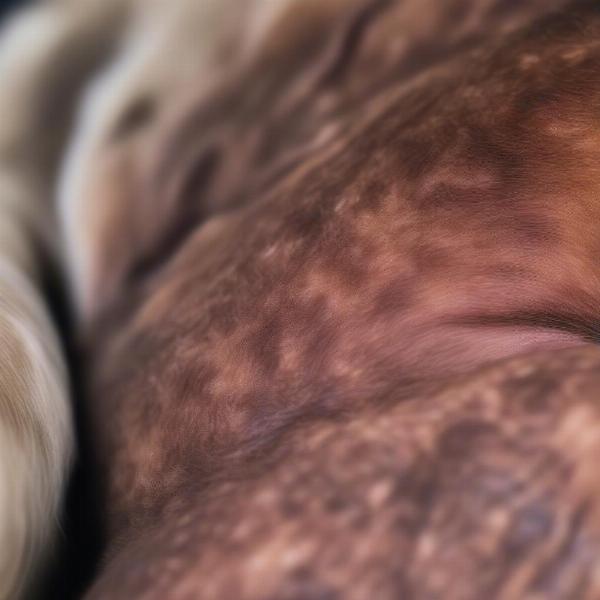If you’ve noticed your dog’s stomach skin darkening, you’re likely concerned. While not always a cause for alarm, black skin on a dog’s stomach can sometimes indicate an underlying health issue. This article will delve into the common causes of skin darkening in dogs, how to differentiate between normal pigmentation and potential problems, and when it’s necessary to seek veterinary attention. We’ll also provide practical tips for managing and treating this condition.
Hyperpigmentation, the darkening of skin due to increased melanin production, is a common occurrence in dogs. It can manifest in various areas, including the belly. Several factors contribute to hyperpigmentation, ranging from harmless hormonal changes to more serious conditions like infections or allergies. Identifying the underlying cause is crucial for determining the appropriate course of action.
Common Causes of Black Skin on a Dog’s Stomach
Several factors can contribute to the darkening of a dog’s belly skin. Some are perfectly normal, while others warrant a closer look:
- Hormonal Changes: As dogs age, their hormone levels fluctuate, which can lead to increased melanin production and consequently, darker skin. This is particularly common in older dogs and certain breeds.
- Allergies: Chronic licking and scratching due to allergies can irritate the skin, leading to inflammation and eventually hyperpigmentation. Environmental allergies, food allergies, and flea allergies are common culprits.
- Friction: Repeated rubbing against rough surfaces, such as carpets or bedding, can cause friction and irritation, ultimately leading to skin thickening and darkening. This is often seen in breeds with short coats or skin folds.
- Infections: Bacterial or fungal skin infections can cause inflammation and discoloration, including darkening of the skin. These infections often present with other symptoms like redness, itching, and hair loss.
- Acanthosis Nigricans: This skin condition is characterized by thickening and darkening of the skin, often affecting the armpits, groin, and belly. It can be a primary condition or secondary to other health problems, such as hypothyroidism or Cushing’s disease.
- Sun Exposure: Just like humans, dogs can develop darker skin in areas exposed to sunlight. This is more common in dogs with light-colored coats and those who spend a lot of time outdoors.
 Dog with black skin on stomach due to allergies
Dog with black skin on stomach due to allergies
When to Seek Veterinary Attention
While some instances of skin darkening are benign, others require veterinary intervention. Consult your veterinarian if you notice any of the following:
- Sudden or rapid changes in skin color
- Itching, redness, or inflammation
- Hair loss or thinning
- Sores, lesions, or unusual growths
- Signs of discomfort or pain
Diagnosing the Cause of Hyperpigmentation
Your veterinarian will perform a thorough physical examination and may recommend additional diagnostic tests to determine the underlying cause of your dog’s hyperpigmentation. These tests may include:
- Skin scraping and cytology
- Fungal culture
- Blood tests
- Allergy testing
- Biopsy
Treatment and Management
Treatment for black skin on a dog’s stomach depends on the underlying cause. Your veterinarian may recommend:
- Medication: Antibiotics, antifungals, or steroids may be prescribed to treat infections or allergies.
- Topical Treatments: Medicated shampoos, creams, or sprays can help soothe irritated skin and reduce inflammation.
- Dietary Changes: If food allergies are suspected, your veterinarian may recommend a hypoallergenic diet.
- Managing Underlying Conditions: If the hyperpigmentation is secondary to another health problem, managing that condition is crucial.
Preventing Skin Darkening
While not all causes of hyperpigmentation are preventable, you can take steps to minimize the risk:
- Regular Grooming: Brush your dog regularly to remove loose hair and debris, and bathe them as needed with a gentle dog shampoo.
- Parasite Prevention: Use flea and tick preventatives to protect your dog from parasites that can cause skin irritation.
- Healthy Diet: Feed your dog a balanced and nutritious diet to support healthy skin and coat.
- Minimize Allergen Exposure: Identify and minimize your dog’s exposure to potential allergens.
Conclusion
Darkening skin on a dog’s stomach can be caused by a variety of factors, some harmless and some requiring veterinary attention. By understanding the potential causes and seeking professional guidance when necessary, you can help keep your furry friend healthy and comfortable. Regular grooming, parasite prevention, and a healthy diet can also help minimize the risk of skin issues.
FAQ
- Is black skin on my dog’s stomach always a sign of a problem? No, not always. Hormonal changes and friction can cause harmless hyperpigmentation. However, it’s best to consult a veterinarian to rule out any underlying medical issues.
- Can allergies cause my dog’s stomach to turn black? Yes, chronic licking and scratching due to allergies can lead to inflammation and hyperpigmentation.
- What should I do if my dog’s stomach skin suddenly turns black? Consult your veterinarian promptly for a proper diagnosis and treatment plan.
- How is hyperpigmentation in dogs treated? Treatment depends on the underlying cause and may include medication, topical treatments, or dietary changes.
- Can I prevent my dog’s stomach skin from turning black? While not all causes are preventable, regular grooming, parasite prevention, and a healthy diet can help minimize the risk.
- What breeds are prone to hyperpigmentation? Breeds like Dachshunds, Poodles, and some Terriers are more predisposed to acanthosis nigricans.
- Is hyperpigmentation painful for dogs? Not typically, but accompanying symptoms like itching or inflammation can be uncomfortable.
ILM Dog is your trusted resource for expert dog care advice. We offer a wealth of information on dog breeds, health, training, nutrition, and more. Our mission is to empower dog owners with the knowledge they need to provide the best possible care for their canine companions. Whether you’re a seasoned dog owner or just starting out, ILM Dog is here to guide you every step of the way. For further assistance, feel free to contact us at [email protected] or +44 20-3965-8624.